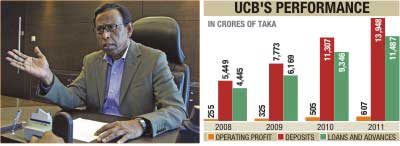A banker who changed the game The chief executive of UCB talks about his strategy that turns the bank successful
 M Shahjahan Bhuiyan
M Shahjahan Bhuiyan
When the banking industry is grappling with high cost of funds and going with higher lending rates, a top banker said the soaring costs of borrowing will threaten the entrepreneurs and the overall economy in the days to come.
“Doing business is becoming costlier as the borrowing cost is getting dangerous. This will have a significant impact on the economy,” said M Shahjahan Bhuiyan, managing director of United Commercial Bank, popularly known as UCB.
He was sharing his thoughts on the banking industry in Bangladesh and the regulator's role in helping the sector grow in an interview with The Daily Star at the Bank's headquarters in Gulshan recently.
“To stop making local products uncompetitive, the regulator should come up with some control over the Banks on the rising borrowing costs,” said Bhuiyan who has been in the banking industry for more than 40 years.
He said some industries have already been affected and are being shut down. The UCB boss also talked about the recent exchange rate volatility where he smells manipulation.
Leading business bodies and entrepreneurs have already raised the issue and expressed their concern. They said after the central bank withdrew the cap on lending rates in the last quarter of 2011 commercial banks started to increase the lending interest rates up to 18 percent. Even the Banks have increased interest rates for the loans taken a year or more ago.
Bhuiyan's stand may puzzle many bankers, but he argued on strong logical ground.
Why have some banks been facing a liquidity shortage? Why does their cash flow get squeezed? Why are they borrowing from the overnight call money market at higher rates?
He said: “It was because of their (Banks) imprudent activities. They invested heavily on speculative market bypassing core banking investments.”
“Some banks mismatched their asset-liability management.”
Borrowers took their industrial or working capital loans straight to the stockmarket and banks failed to supervise those misdeeds, which he said had an impact on some banks' cash flow.
He called upon the central bank to carry out an investigation into the banks that are taking deposits at higher rates.
Bhuiyan is a luminary in the banking business. After graduating from Dhaka University he joined the then State Bank of Pakistan in 1970. He worked in Pubali Bank for 16 years before switching to City Bank and UCB in different senior positions. He then served Prime Bank for nine years, of which five and a half years as managing director.
He joined the trouble-torn UCB in 2008 as its managing director and magically turned the Bank into a very successful one.
Deposits, loans and advances have gone up nearly four times between 2008 and 2011. Non-performing loan which is an important indicator in assessing a Bank's soundness has come down to less than 2 percent in 2011 from 4.62 percent in 2008.
Bhuiyan recently won the country's first-ever best banker award for his outstanding contribution to steering the troubled-bank into a profitable one.
Now Bhuiyan dreams even bigger -- to turn the Bank into a model financial institution.
What magic he has played?
“Though late, the board has understood that the Bank is missing out huge business potential,” said Bhuiyan.
“They (directors) are young, professional businessmen and understand the economy. All they needed a confident and efficient management,” he said. “This mixture has worked and the board has seen that it is yielding results for the Bank.”
He said, a lot of customers who left the Bank for its poor services, started coming back. Now customers are marketing for the Bank.
All he had to do was an overhaul of the employees' mindset and policies and setting up the goal. He tried to bring a dynamic and enthusiastic environment in the working process.
“UCB as a first generation private bank earlier did not recruit employees on the basis of merit. So, they failed to net and deliver customers,” he said.
To him, training the employees is a continuous process. “Not only training, they must be given incentives to be inspired to deliver their best,” he said, citing an example of welfare fund established for the employees. He also introduced performance-based incentives and promotions for the employees.
He holds high hopes about Bangladesh. According to him, there is no dearth of ideas, businesses and manpower in the country. Banks have a role to advise and guide new entrepreneurs as they did in flourishing apparel industries in the country, he said.
“Man will get old and die, but not an organisation. A good institution has to adjust with the changes to deliver efficiently.”
The Daily Star/Bangladesh/ 11th March 2012




Comments